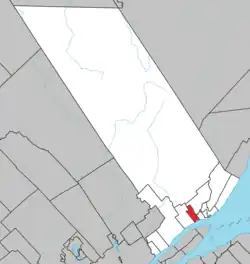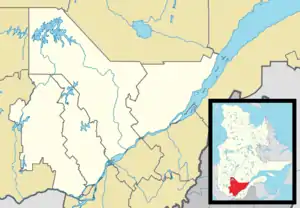Beaupré | |
|---|---|
 Quebec Route 138 in Beaupré | |
 Location within La Côte-de-Beaupré RCM. | |
 Beaupré Location in central Quebec. | |
| Coordinates: 47°03′N 70°54′W / 47.050°N 70.900°W[1] | |
| Country | |
| Province | |
| Region | Capitale-Nationale |
| RCM | La Côte-de-Beaupré |
| Constituted | April 23, 1928 |
| Government | |
| • Mayor | Pierre Renaud |
| • Federal riding | Beauport—Côte-de-Beaupré—Île d'Orléans—Charlevoix |
| • Prov. riding | Charlevoix–Côte-de-Beaupré |
| Area | |
| • Total | 26.90 km2 (10.39 sq mi) |
| • Land | 22.97 km2 (8.87 sq mi) |
| Population | |
| • Total | 4,117 |
| • Density | 179.2/km2 (464/sq mi) |
| • Pop 2016-2021 | |
| • Dwellings | 2,812 |
| Time zone | UTC−5 (EST) |
| • Summer (DST) | UTC−4 (EDT) |
| Postal code(s) | |
| Area codes | 418 and 581 |
| Highways | |
| Website | www |
Beaupré is a ville in the Canadian province of Quebec, located in La Côte-de-Beaupré Regional County Municipality. The town is along the Saint Lawrence River and Route 138 at the mouth of the Sainte-Anne-du-Nord River.
Mont-Sainte-Anne, the highest skiing station in the eastern part of Canada, is located in Beaupré. It is also one of the town's major sport attractions.
History
The area has been inhabited since the beginning of the New France colony. In the 17th century, Breton sailors, when landing on the coastal plains, reputedly exclaimed: "Oh! le beau pré" ("Oh! the beautiful meadow"). The fused form of Beaupré has been in use since at least 1636 when the Beaupré Company was established. Its parish formed out of two of the oldest parishes of Quebec, Sainte-Anne-de-Beaupré and Saint-Joachim. Its population in 1666 was 533 inhabitants, comparable to Quebec with 547 inhabitants.[4]
In 1928, the place was incorporated as the Parish Municipality of Notre-Dame-du-Rosaire but its name was changed to Beaupré that same year in order to avoid confusion with several other namesake parishes.[1] In 1962, the parish municipality gained town status and became Ville de Beaupré.[1]
Demographics
In the 2021 Census of Population conducted by Statistics Canada, Beaupré had a population of 4,117 living in 1,859 of its 2,812 total private dwellings, a change of 9.7% from its 2016 population of 3,752. With a land area of 22.97 km2 (8.87 sq mi), it had a population density of 179.2/km2 (464.2/sq mi) in 2021.[5]
Population trend:[6]
- Population in 2021: 4,117 (2016 to 2021 population change: 9.7%)
- Population in 2016: 3,754
- Population in 2011: 3,439 (2006 to 2011 population change: 14.4%)
- Population in 2006: 3,006 (2001 to 2006 population change: 8.9%)
- Population in 2001: 2,761
- Population in 1996: 2,799
- Population in 1991: 2,676
Mother tongue:
- English as first language: 1.6%
- French as first language: 95.9%
- English and French as first language: 0%
- Other as first language: 2.5%
Industries
- Caron et Guay, doors and windows
One of the region's major employers, AbitibiBowater closed its plant there in October 2009.[7] On 13, the city authorized the destruction of the old 1927 plant following various soliciting attempts.
See also
References
- 1 2 3 "Beaupré (Ville)" (in French). Commission de toponymie du Québec. Retrieved 2010-04-27.
- 1 2 Ministère des Affaires municipales, des Régions et de l'Occupation du territoire - Répertoire des municipalités: Beaupré Archived 2012-01-04 at the Wayback Machine
- 1 2 Statistics Canada 2021 Census - Beaupré census profile
- ↑ Boréal Express, recensement de 1666, Montréal (Québec), 1977
- ↑ "Population and dwelling counts: Canada, provinces and territories, and census subdivisions (municipalities), Quebec". Statistics Canada. February 9, 2022. Retrieved August 29, 2022.
- ↑ Statistics Canada: 1996, 2001, 2006, 2011, 2016, 2021 census
- ↑ Leduc, Gilbert (23 September 2010). "AbitibiBowater: l'usine de Beaupré rasée". Le Soleil. Retrieved 20 December 2010.